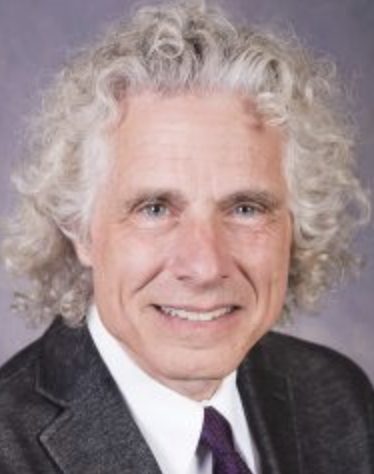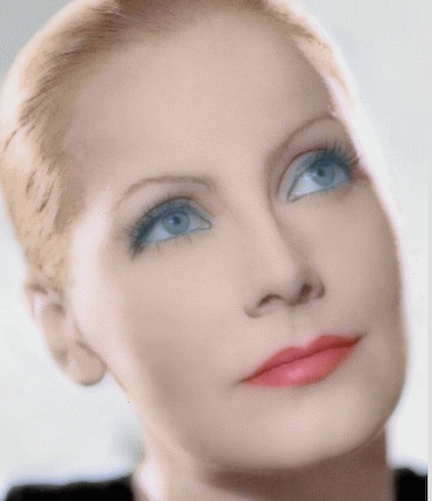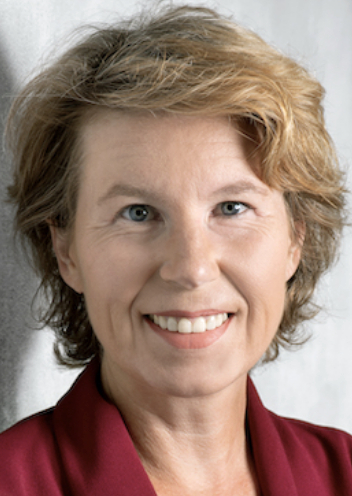September 18
Steven Pinker

On this date in 1954, Steven Pinker, who, according to The Guardian, has “the looks of a rock star, a fondness for early Woody Allen movies, and a world-class reputation as a scientist and writer,” was born in Montreal’s Anglophone Jewish community. Pinker earned a bachelor’s with first-class honors in experimental psychology from McGill University (1976) and a Ph.D. in experimental psychology from Harvard in 1979. Pinker, published extensively in the fields of linguistics and experimental psychology, taught at MIT for 21 years and now is Johnstone Professor of Psychology at Harvard.
Among his numerous books are The Language Instinct (1994), How the Mind Works (1997), The Blank Slate: The Modern Denial of Human Nature (2002), The Stuff of Thought: Language as a Window into Human Nature (2007), The Better Angels of Our Nature: Why Violence Has Declined (2011), Language, Cognition, and Human Nature: Selected Articles (2013), The Sense of Style: The Thinking Person’s Guide to Writing in the 21st Century (2014), and Enlightenment Now: The Case for Reason, Science, Humanism, and Progress (2018). His writings have frequently appeared in Time, The New Republic, The New York Times and many other magazines and newspapers.
Pinker has won numerous writing awards, was named by Time magazine as one of the most influential people in the world in 2004 and was added by Foreign Policy in 2011 to its list of top global thinkers. He was elected to the National Academy of Sciences in 2016. In addition to receiving six honorary doctorates, Pinker is a Humanist Laureate, 2006 Humanist of the Year and honorary president of the Canadian Psychological Association.
A longtime critic of creationism, Pinker wrote in a 2009 Boston Globe op-ed, “Virtually no scientist takes ‘intelligent design’ seriously, and in the famous Dover, Pennsylvania trial in 2005, a federal court ruled that it is religion in disguise.” In a 2007 Salon.com interview, Pinker and his wife, Rebecca Newberger Goldstein, said they were proud atheists. Pinker continued, “Atheists are the most reviled minority in the United States, so it’s no small matter to come out and say it. … I would put faith in the same category [as alchemy] because faith is believing something without a good reason to believe it.”
He fought and won against a proposal at Harvard to require a course on “Reason and Faith.” About that he wrote, “[U]niversities are about reason, pure and simple. Faith — believing something without good reasons to do so — has no place in anything but a religious institution, and our society has no shortage of these. Imagine if we had a requirement for ‘Astronomy and Astrology’ or ‘Psychology and Parapsychology.’ ” (The Harvard Crimson, Oct. 27, 2006.)
Pinker, who has been a guest on Freethought Radio, was awarded FFRF’s 2004 Emperor Has No Clothes Award for his plain speaking on religion and in appreciation of his forthright espousal of his rational views. He is also a member of FFRF’s honorary board.
“I was never religious in the theological sense. I never outgrew my conversion to atheist at 13.”
— Pinker, quoted in "Steven Pinker: the mind reader," the UK Guardian (Nov. 6, 1999)
Greta Garbo

On this date in 1905, enigmatic Swedish actress Greta Garbo (née Greta Lovisa Gustafsson) was born in Stockholm to working-class parents Anna (Johansson) and Karl Gustafsson. She was christened the next day by a Church of Sweden pastor.
The family’s financial struggles worsened with her father’s death when Garbo was 14. She left school, where she wasn’t a particularly good student but was interested in theater despite her shyness, to work as a “soap girl” applying lather to men’s faces before the barber shaved them.
A department store job led to work as a model, studies at the Royal Dramatic Training Academy and recruitment in 1924 by the Finnish director Mauritz Stiller to play a secondary part in his silent film “The Saga of Gösta Berling,” in which she falls for Berling, a Lutheran priest defrocked over his fondness for alcohol. Stiller convinced her to change her name to Garbo.
The movie led to other roles, and during a visit to Berlin, Louis B. Mayer of Metro-Goldwyn-Mayer Studios met her. She and Stiller signed with MGM and in 1925 boarded a ship to America, Garbo with the inability to speak English. Her first American film was “Torrent” in 1926, the year her actress sister Alva died of tuberculosis in Sweden. Some thought her beauty exceeded Garbo’s.
Her next films catapulted her to international stardom: “The Temptress” (1926), “Flesh and the Devil” (1927), “A Woman of Affairs,” “The Mysterious Lady” (1928) and “Wild Orchids” and “The Kiss” (1929). “Anna Christie” (1930) was her first sound film. MGM marketed it with the tagline “Garbo talks!” and the film led to the first of her three Oscar nominations, all unsuccessful.
Garbo made 13 more movies from then until 1941, when “Two-Faced Woman,” widely panned and directed by George Cukor, was her last at age 35. In between notably were “Mata Hari,” “Grand Hotel,” Somerset Maugham‘s “The Painted Veil,” “Anna Karenina,” “Camille” and the comedy “Ninotchka.”
Many critics and film historians consider her role as the doomed courtesan Marguerite Gautier in “Camille” (1936) as her finest performance. “Grand Hotel” (1932) was the source of the line most associated with her name: “I want to be alone.” She later clarified that with “I never said ‘I want to be alone.’ I only said ‘I want to be left alone.’ There is all the difference.” She once told the actor David Niven that she’d quit because she had “made enough faces.”
In his biography “Garbo” (2021), Robert Gottlieb wrote that she had never liked the limelight and lacked the relentless drive of contemporaries like Marlene Dietrich. “She doesn’t seem to have been particularly vain about her beauty, but she was practical enough to know its precise value, and to anticipate the cost of its fading.”
Garbo never married and never had children but did have relationships, publicly with several men, and perhaps privately with a few women. Regarding religion, Gottlieb wrote: “As for Garbo and church, I haven’t come upon any references to her ever attending one, although perhaps she was tempted by [singer] Jessica Dragonette’s Catholicism — if so, it didn’t take.” Lilli Palmer, a German-born actress married to Rex Harrison, wrote in her 1975 autobiography: “Her daily walks were her religion; she withered when she was deprived of them.”
After quitting the movies, she moved to New York City, traveled frequently abroad with friends and compiled an estate of at least $32 million by investing in art, real estate and securities. She became a U.S. citizen in 1951 and died of renal failure and pneumonia at age 84. She was cremated in Manhattan with her ashes interred in Stockholm. (D. 1990)
“I would like to believe in a life after death, but the different religions have each got their own different solution. In America people go to church a lot, but I don’t know if they’re any more religious for all that. I know that there are many people who are convinced of life after death, but I haven’t been given the capacity for belief.”
— Garbo comments to journalist and biographer Sven Broman on one of their walks, "Garbo on Garbo" (1991)
Sabine Hossenfelder

On this date in 1976, Sabine Hossenfelder — theoretical physicist, author and science communicator — was born in Frankfurt am Main, Germany. “I’ve grown up an atheist, I was never baptized,” she later wrote. “I didn’t know much of God until I went to school and had to attend religion class, against my mother’s will.” (medium.com, “The Rising Star of Science,” Dec. 23, 2014)
She earned a B.S. and an M.S. in mathematics from Johann Wolfgang Goethe-Universität in Frankfurt, where she was awarded a doctorate in theoretical physics in 2003. She subsequently worked as a research fellow at the University of Arizona-Tucson, University of California-Santa Barbara and at the Perimeter Institute in Waterloo, Ontario.
Hossenfelder joined the Nordita Institute for Theoretical Physics in Stockholm in 2009 as an assistant professor and was employed by the Frankfurt Institute for Advanced Studies between 2015-22. As of this writing in 2023, she is associated with the Munich Center for Mathematical Philosophy in Germany: “I am working on physics beyond the standard model, phenomenological quantum gravity, and modifications of [Einstein’s theory of] general relativity,” she wrote on her website.
She and Stefan Scherer, also a Ph.D. physicist, married in 2006 and have twin daughters, Lara and Gloria, born in December 2010.
Her free weekly newsletter includes noteworthy items from the past week centered around topics covered on her YouTube channel “Science Without the Gobbledygook.” It has almost 750,000 subscribers. She has blogged regularly since 2006, currently at Backreaction.
Hossenfelder says science is more than a profession. “It’s a way to make sense of the world. It’s a way to find unity with nature. Most scientists are atheists, not so much because belief and superstition have no place in science, but because, as [Pierre-Simon] Laplace put it so aptly, God is a useless hypothesis. Why spend the Sunday in church when you can spend it in the lab?” (medium.com, Ibid.)
In “Existential Physics: A Scientist’s Guide to Life’s Biggest Questions” (2022), she posited that science and religion have the same roots. “They tackle many identical questions: Where did we come from? How did we get here? How much do we know? … Physics has come the closest to answering these questions.” (Hippocampus Magazine, Sept. 7, 2022) Library Journal called it an excellent book on physics for general readers.
Her first book, “Lost in Math: How Beauty Leads Physics Astray” (2018), was written in English and translated into German, French, Spanish, Polish, Japanese, Romanian, Korean, Chinese, Hungarian and Italian. She contributes to the Forbes column Starts with a Bang edited by astrophysicist Ethan Siegel (formerly hosted by medium.com), Quanta Magazine, New Scientist, Scientific American, Nautilus Quarterly and numerous others.
“Science tells you that praying doesn’t cure cancer, that there is no immortal soul that lives when your body rots away. Science tells you there is nobody to watch over you, and that there are no rights and wrongs other than the ones that we create. Scientists deliver the truth and then leave you alone to deal with it,” wrote Hossenfelder on the need to make science more accessible to the general public. (medium.com, Ibid.) “If you are struggling to make sense of life, you don’t go and talk to a professor of neurology. If you’re suffering from unrequited love, you don’t look for advice in a journal of evolutionary psychology. If you’re having a phase of bad luck, you don’t seek solace by attending a lecture on statistics. Science isn’t helpful for most people because they don’t know what science has to give. And nobody is there to tell them.”
PHOTO CREDIT: Warner Kissel
“The world is still dominated by religion rather than science, it is still full with people who think that the laws of nature are somehow optional, that you can either believe or not believe in scientific evidence. And this religious dominance stalls the progress we need to improve the lives of the sick and poor. How come that in a time when the light of science shines so brightly, many people still prefer sitting in the dark?”
— Hossenfelder, medium.com, "The Rising Star of Science" (Dec. 23, 2014)
